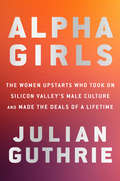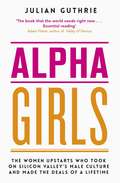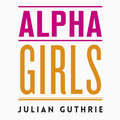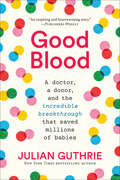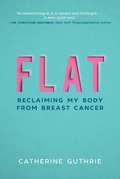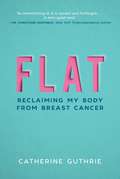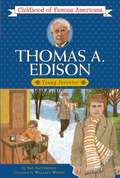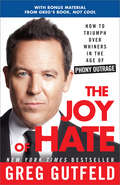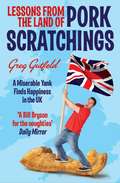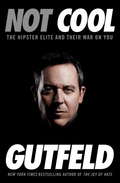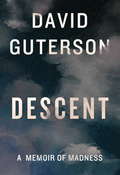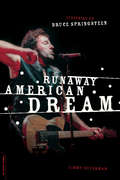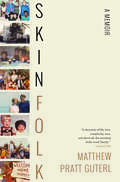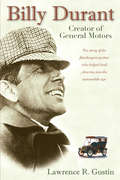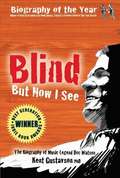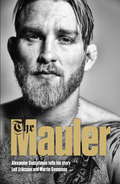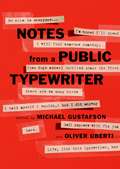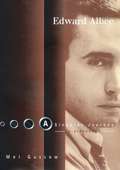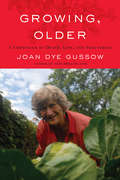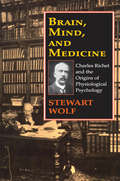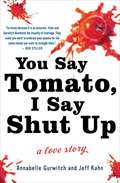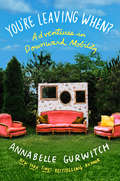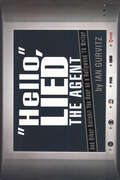- Table View
- List View
Alpha Girls: The Women Upstarts Who Took On Silicon Valley's Male Culture and Made the Deals of a Lifetime
by Julian GuthrieAn unforgettable story of four women who, through grit and ingenuity, became stars in the cutthroat, high-stakes, male dominated world of venture capital in Silicon Valley, and helped build some of the foremost companies of our time. In Alpha Girls, award-winning journalist Julian Guthrie takes readers behind the closed doors of venture capital, an industry that transforms economies and shapes how we live. We follow the lives and careers of four women who were largely written out of history - until now. Magdalena Yesil, who arrived in America from Turkey with $43 to her name, would go on to receive her electrical engineering degree from Stanford, found some of the first companies to commercialize internet access, and help Marc Benioff build Salesforce. Mary Jane Elmore went from the corn fields of Indiana to Stanford and on to the storied venture capital firm IVP - where she was one of the first women in the U.S. to make partner - only to be pulled back from the glass ceiling by expectations at home. Theresia Gouw, an overachieving first-generation Asian American from a working-class town, dominated the foosball tables at Brown (she would later reluctantly let Sergey Brin win to help Accel Partners court Google), before she helped land and build companies including Facebook, Trulia, Imperva, and ForeScout. Sonja Hoel, a Southerner who became the first woman investing partner at white-glove Menlo Ventures, invested in McAfee, Hotmail, Acme Packet, and F5 Networks. As her star was still rising at Menlo, a personal crisis would turn her into an activist overnight, inspiring her to found an all-women's investment group and a national nonprofit for girls.These women, juggling work and family, shaped the tech landscape we know today while overcoming unequal pay, actual punches, betrayals, and the sexist attitudes prevalent in Silicon Valley and in male-dominated industries everywhere. Despite the setbacks, they would rise again to rewrite the rules for an industry they love. In Alpha Girls, Guthrie reveals their untold stories.
Alpha Girls: The Women Upstarts Who Took on Silicon Valley's Male Culture and Made the Deals of a Lifetime
by Julian GuthrieA Financial Times Summer Book of 2019'The addictive stories of four incredible women who did things their own way and rewrote the code of a whole industry' Emerald StreetDescribed as 'the book that the world needs right now' (Adam Fisher, author of Valley of Genius), Alpha Girls is perfect for fans of Hidden Figures, Lean In and The Social Network.Silicon Valley has long been at the forefront of innovation, but it is renowned for its archaic sexist culture. Alpha Girls is the unforgettable story how a group of talented women achieved success in a tech world run by 'bro-grammers' through sheer grit and determination. Despite the instrumental role they played in building some of the foremost companies of our time, these women have been written out of history - until now. In Alpha Girls, award-winning writer Julian Guthrie reveals their untold stories.*Magdalena Yesil who arrived in America from Turkey with $43 to her name and would go on to help Marc Benioff build Salesforce. *Mary Jane Elmore - one of the first women in the United States to make partner at a venture capital firm. *Theresia Gouw, who helped land and build companies including Facebook, Trulia, Imperva and ForeScout. *Sonja Hoel, the first woman investing partner at Menlo Ventures who invested in McAfee, Hotmail, Acme Packet and F5 Networks as well as founding an all-women's investment group and a national nonprofit for girls.These women, juggling work and family, shaped the tech landscape we know today while overcoming unequal pay, actual punches, betrayals and the sexist attitudes prevalent in Silicon Valley. Despite the setbacks, they would rise again to rewrite the rules for an industry they love.
Alpha Girls: The Women Upstarts Who Took on Silicon Valley's Male Culture and Made the Deals of a Lifetime
by Julian GuthrieA Financial Times Summer Book of 2019'The addictive stories of four incredible women who did things their own way and rewrote the code of a whole industry' Emerald StreetDescribed as 'the book that the world needs right now' (Adam Fisher, author of Valley of Genius), Alpha Girls is perfect for fans of Hidden Figures, Lean In and The Social Network.Silicon Valley has long been at the forefront of innovation, but it is renowned for its archaic sexist culture. Alpha Girls is the unforgettable story how a group of talented women achieved success in a tech world run by 'bro-grammers' through sheer grit and determination. Despite the instrumental role they played in building some of the foremost companies of our time, these women have been written out of history - until now. In Alpha Girls, award-winning writer Julian Guthrie reveals their untold stories.*Magdalena Yesil who arrived in America from Turkey with $43 to her name and would go on to help Marc Benioff build Salesforce. *Mary Jane Elmore - one of the first women in the United States to make partner at a venture capital firm. *Theresia Gouw, who helped land and build companies including Facebook, Trulia, Imperva and ForeScout. *Sonja Hoel, the first woman investing partner at Menlo Ventures who invested in McAfee, Hotmail, Acme Packet and F5 Networks as well as founding an all-women's investment group and a national nonprofit for girls.These women, juggling work and family, shaped the tech landscape we know today while overcoming unequal pay, actual punches, betrayals and the sexist attitudes prevalent in Silicon Valley. Despite the setbacks, they would rise again to rewrite the rules for an industry they love.
Good Blood: A Doctor, a Donor, and the Incredible Breakthrough that Saved Millions of Babies
by Julian GuthrieThe New York Times–bestselling author of How to Make a Spaceship presents the remarkable, uplifting story of a life-saving medical breakthrough. In 1951 in Sydney, Australia, a fourteen-year-old boy named James Harrison was near death when he received a transfusion of blood that saved his life. A few years later, and half a world away, a shy young doctor at Columbia University realized he was more comfortable in the lab than in the examination room. Neither could have imagined how their paths would cross, or how they would change the world. In Good Blood, Julian Guthrie tells the gripping tale of the race to cure Rh disease, a horrible blood disease that caused a mother’s immune system to attack her own unborn child. The story is anchored by two very di?erent men on two continents: Dr. John Gorman in New York, who would land on a brilliant yet contrarian idea, and an unassuming Australian whose almost magical blood—and his unyielding devotion to donating it—would save millions of lives. Good Blood takes us from research laboratories to hospitals, and even into Sing Sing prison, where experimental blood trials were held. It is a tale of discovery and invention, the progress and pitfalls of medicine, and the everyday heroics that fundamentally changed the health of women and babies.
Flat: Reclaiming My Body from Breast Cancer
by Catherine Guthrie<p>A feminist breast cancer memoir of medical trauma, love, and how she found the strength to listen to her body. <p>As a young, queer woman, Catherine Guthrie had worked hard to feel at home in her body. However, after years writing about women’s health and breast cancer, Guthrie is thrust into the role of the patient after a devastating diagnosis at age thirty-eight. At least, she thinks, I know what I'm up against. <p>She was wrong. In one horrifying moment after another, everything that could go wrong does—the surgeon gives her a double mastectomy but misses the cancerous lump, one of the most effective drug treatments fails, and a doctor's error may have unleashed millions of breast cancer cells into her body. <p>Flat is Guthrie’s story of how two bouts of breast cancer shook her faith in her body, her relationship, and medicine. Along the way, she challenges the view that breasts are essential to femininity and paramount to a woman’s happiness. Ultimately, she traces an intimate portrayal of how cancer reshapes her relationship with Mary, her partner, revealing—in the midst of crisis—a love story. <p>Filled with candor, vulnerability, and resilience, Guthrie upends the “pink ribbon” narrative and offers a unique perspective on womanhood, what it means to be “whole,” and the importance of women advocating for their desires. Flat is a story about how she found the strength to forge an unconventional path—one of listening to her body—that she’d been on all along.</p>
Flat: Reclaiming My Body from Breast Cancer
by Catherine GuthrieA feminist breast cancer memoir of medical trauma, love, and how she found the strength to listen to her body. As a young, queer woman, Catherine Guthrie had worked hard to feel at home in her body. However, after years writing about women’s health and breast cancer, Guthrie is thrust into the role of the patient after a devastating diagnosis at age thirty-eight. At least, she thinks, I know what I'm up against. She was wrong. In one horrifying moment after another, everything that could go wrong does—the surgeon gives her a double mastectomy but misses the cancerous lump, one of the most effective drug treatments fails, and a doctor's error may have unleashed millions of breast cancer cells into her body. Flat is Guthrie’s story of how two bouts of breast cancer shook her faith in her body, her relationship, and medicine. Along the way, she challenges the view that breasts are essential to femininity and paramount to a woman’s happiness. Ultimately, she traces an intimate portrayal of how cancer reshapes her relationship with Mary, her partner, revealing—in the midst of crisis—a love story. Filled with candor, vulnerability, and resilience, Guthrie upends the “pink ribbon” narrative and offers a unique perspective on womanhood, what it means to be “whole,” and the importance of women advocating for their desires. Flat is a story about how she found the strength to forge an unconventional path—one of listening to her body—that she’d been on all along.
Thomas A. Edison:Young Inventor (Childhood of Famous American Series)
by Sue GuthridgeA biography focusing on the childhood of the inventor who patented more than 1,000 inventions in sixty years, among them the electric light and the phonograph.
The Joy of Hate: How to Triumph over Whiners in the Age of Phony Outrage
by Greg GutfeldFrom the irreverent star of Fox News's Red Eye and The Five, hilarious observations on the manufactured outrage of an oversensitive, wussified culture.Greg Gutfeld hates artificial tolerance. At the root of every single major political conflict is the annoying coddling Americans must endure of these harebrained liberal hypocrisies. In fact, most of the time liberals uses the mantle of tolerance as a guise for their pathetic intolerance. And what we really need is smart intolerance, or as Gutfeld reminds us, what we used to call common sense.The Joy of Hate tackles this conundrum head on--replacing the idiocy of open-mindness with a shrewd judgmentalism that rejects stupid ideas, notions, and people. With countless examples grabbed from the headlines, Gutfeld provides readers with the enormous tally of what pisses us all off. For example:- The double standard: You can make fun of Christians, but God forbid Muslims. It's okay to call a woman any name imaginable, as long as she's a Republican. And no problem if you're a bigot, as long as you're politically correct about it. - The demonizing of the Tea Party and romanticizing of the Occupy Wall Streeters. - The media who are always offended (see MSNBC lineup)- How critics of Obamacare or illegal immigration are somehow immediately labeled racists. - The endless debate over the Ground Zero Mosque (which Gutfeld planned to open a Muslim gay bar next to). - As well as pretentious music criticism, slow-moving ceiling fans, and snotty restaurant hostesses. Funny and sarcastic to the point of being mean (but in a nice way), The Joy of Hate points out the true jerks in this society and tells them all off.
Lessons from the Land of Pork Scratchings
by Greg GutfeldA stressed-out New York men's magazine editor gets posted to the UK and realises happiness is more easily achieved by adopting the British attitude to life - expecting the worst and going to the pub.
Not Cool
by Greg GutfeldBehind every awful, dangerous decision lurks one evil beast: the Cool. From politics to the personal, from fashion to food, from the campus to the locker room, the desire to be cool has infected all aspects of our lives. At its most harmless, it is annoying. At its worst, it is deadly, on a massive scale. The Cool are the termites of life, infiltrating every nook and cranny and destroying it from within. The Cool report the news, write the scripts, teach our children, run our government--and each day they pass judgment on those who don't worship at the altar of their coolness. The cool fawn over terrorists, mock the military, and denigrate employers. They are, in short, awful people. From what we wear and what we eat, to what we smoke and who we poke, pop culture is crafted and manipulated by the cool and, to Greg Gutfeld, that's Not Cool. How do the cool enslave you? By convincing you that: - If you don't agree with them no one will like you. - If you don't follow them you will miss out on life. - If you don't listen to them you will die a lonely loserHow do you vanquish the cool and discover your own true self? Read this book. In Not Cool, Greg Gutfeld, bestselling author of The Joy Of Hate, lays out the battle plan for reclaiming the real American ideal of cool--building businesses, protecting freedom at home and abroad, taking responsibility for your actions, and leaving other people alone to live as they damn well please. Not Cool fights back against the culture of phonies, elitists, and creeps who want your soul. It's not a book, it's a weapon--and one should be armed with it at all times.From the Hardcover edition.
Descent
by David GutersonFrom the best-selling author of Snow Falling on Cedars: a poignant, searching memoir about one man's fall into depression in the wake of a national tragedy, and his brave struggle to return to normalcy. Like most of the country and the world, David Guterson woke up on Tuesday, September 11th, 2001, not thinking history was about to change. He was in Washington, D.C., with a group of fellow writers, evaluating grant applications for the National Endowment of the Arts. But before their work day had even begun, the Pentagon was bombed; the Twin Towers were down in New York City; and havoc was wreaked irrevocably on our collective sense of happiness, security, and national pride. Scrambling to get out of the city and back home any way he could, David, along with two fellow writers, rented a car and drove 2,600 miles across the country to Seattle. But the attacks triggered something inside him, a pervasive feeling of hopelessness, fear, despair--a clinical depression that that would not go away. He lost interest in his work, family, friends--his life. Inspired by William Styron's masterful Darkness Visible, Guterson's Descent is the searing account of one man's envelopment by the darkest of human emotions, and his tunneling out. Powerful, intense, and deeply felt, it is at once personal and universally illuminating--a confession from a great literary mind who takes us on a journey of what it feels like, and means, to lose one's grasp on the world--and to find it once more, even if by fumbling in the dark.
Runaway American Dream: Listening to Bruce Springsteen
by Jimmy GutermanOver the course of a career now in its fourth decade, Bruce Springsteen has earned one of the most passionate, devoted followings in all rock 'n' roll. He's selling more records and concert tickets in his fifties than he sold in his twenties.<P><P> Yet to many fans he remains an enigma. How has Springsteen produced such a consistent body of work and retained his currency while other top rock 'n' rollers have gone by the wayside? Jimmy Guterman, an accessible and entertaining music writer, has been writing about Springsteen since the late 1970s. In Runaway American Dream, he delves deep into dramatic and crucial moments from every phase of Springsteen's career, interpreting the songs and incisively commenting on the man and the culture at large to deliver a nuanced portrait of The Boss from the earliest days right up to Springsteen's 2005 album, Devils & Dust.
Josephine Baker and the Rainbow Tribe
by Matthew Pratt GuterlCreating a sensation with her risqué nightclub act and strolls down the Champs Elysées, pet cheetah in tow, Josephine Baker lives on in popular memory as the banana-skirted siren of Jazz Age Paris. In Josephine Baker and the Rainbow Tribe, Matthew Pratt Guterl brings out a little known side of the celebrated personality, showing how her ambitions of later years were even more daring and subversive than the youthful exploits that made her the first African American superstar. Her performing days numbered, Baker settled down in a sixteenth-century chateau she named Les Milandes, in the south of France. Then, in 1953, she did something completely unexpected and, in the context of racially sensitive times, outrageous. Adopting twelve children from around the globe, she transformed her estate into a theme park, complete with rides, hotels, a collective farm, and singing and dancing. The main attraction was her Rainbow Tribe, the family of the future, which showcased children of all skin colors, nations, and religions living together in harmony. Les Milandes attracted an adoring public eager to spend money on a utopian vision, and to worship at the feet of Josephine, mother of the world. Alerting readers to some of the contradictions at the heart of the Rainbow Tribe project--its undertow of child exploitation and megalomania in particular--Guterl concludes that Baker was a serious and determined activist who believed she could make a positive difference by creating a family out of the troublesome material of race.
Skinfolk: A Memoir
by Matthew Pratt GuterlA haunting, poignant story of growing up in a mixed-race family in 1970s New Jersey, in the tradition of The Color of Water. Race is made, not born. It can materialize with a thunderous suddenness. It can happen to you in moments that will be cauterized into memory as if into flesh. Could a picturesque white house with a picket fence save the world? What if it was filled with children drawn together from around the globe? And what if, within the yard, the lines of kin and skin, of family and race, were deliberately knotted and twisted? In 1970, a wild-eyed dreamer, Bob Guterl, believed it could. Bob was determined to solve, in one stroke, the problems of overpopulation and racism. The charming, larger-than-life lawyer and his brilliant wife, Sheryl, a former homecoming queen, launched a radical experiment to raise their two biological sons alongside four children adopted from Korea, Vietnam, and the South Bronx—the so-called war zones of the American century. They moved to rural New Jersey with dreams of creating what Bob described as a new Noah’s ark, filled with “two of every race.” While the venture made for a great photograph, with the proverbial “casseroles and potato chips out for everyone,” the Brady Brunch façade began to crack once reality seeped into the yard, adding undue complexity to the ordinary drama of a big family. Neighbors began to stare. Vacations went wrong. Joy and laughter commingled with discomfort and alienation. Familial bonds inevitably buckled. In the end, this picture-perfect family was no longer, and memories of the idyllic undertaking were marred by tragedy. In lyrical yet wrenching prose, Matthew Pratt Guterl, one of the children, narrates a family saga of astonishing originality, in which even the best intentions would prove woefully inadequate. He takes us inside the clapboard house where Bob and Sheryl raised their makeshift brood in a nation riven then as now by virulent racism and xenophobia. Chronicling both the humor and pathos of this experiment, he “opens a door to our dreams of what the idea of family might make possible.” In the tradition of James McBride’s The Color of Water, Skinfolk exposes the joys and constraints of love, blood, and belonging, and the persistent river of racial violence in America, past and present.
Billy Durant: Creator of General Motors
by Lawrence R. GustinWhat explains Billy Durant's powerful influence on the auto industry during its early days? And why, given Durant's impact, has he been nearly forgotten for decades? In search of answers to these questions, Lawrence Gustin interviewed Durant's widow, who provided a wealth of previously unpublished autobiographical notes, letters, and personal papers. Gustin also interviewed two of Durant's personal secretaries and others who had known and worked with the man who created General Motors. The result is the amazing account of the mastermind behind what would become, as the twentieth century progressed, the world's largest company.
Blind but Now I See: The Biography of Music Legend Doc Watson
by Kent Gustavson<P>From the day Doc Watson stepped off the bus in New York City, the North Carolina music legend changed the world forever. His influence has been recognised by presidents and by the heroes of modern music. This is the first comprehensive biography of Doc Watson, with never before released details about the American guitar icons life. <P>This book includes new interviews with popular musicians: Ben Harper, Michelle Shocked, Warren Haynes, Sam Bush, Bela Fleck, Tom Paxton, Maria Muldaur, John Cohen, Mike Seeger, Peggy Seeger, Abigail Washburn, Ketch Secor, Marty Stuart, Norman Blake, Tony Rice, Pat Donohue, Peter Rowan, Si Kahn, Tommy Emmanuel, Tony Trischka, Greg Brown, Guy Clark, Don Rigsby, David Grisman, Alice Gerrard, Alan O Bryant, Edgar Meyer, Guy Davis, Jack Lawrence, Tao Rodriguez-Seeger, Jean Ritchie, Jerry Douglas, Jonathan Byrd, Larry Long, Paddy Moloney, and many more. . .
The Mauler
by Alexander GustafssonAs told to Leif Eriksson and Martin Svensson.Alexander Gustafsson grew up in Arboga, a small town in Sweden. A country boy, he started boxing when he was 10 - winning the national youth medal at the age of 16. After a handful of run-ins with the law he began practicing mixed martial arts and working his way up the ranks of the UFC. Nicknamed The Mauler by his training partners, due to his power, killer instinct and somewhat recklessness whilst fighting; this is the story of Gustafssons struggle to succeed in one of the world's most challenging sports. Family, friends, and the Christian faith all play decisive rolls. But above all, it's Alexander's unique talent for martial arts which, in just a few short years, sees him become one of the UFC's main poster boys.The Mauler is a frank and at times painful account of a young man rapidly heading off the rails, and of his fight to reach the top of his game in an effort to change his life forever.
The Mauler
by Alexander GustafssonAs told to Leif Eriksson and Martin Svensson.Alexander Gustafsson grew up in Arboga, a small town in Sweden. A country boy, he started boxing when he was 10 - winning the national youth medal at the age of 16. After a handful of run-ins with the law he began practicing mixed martial arts and working his way up the ranks of the UFC. Nicknamed The Mauler by his training partners, due to his power, killer instinct and somewhat recklessness whilst fighting; this is the story of Gustafssons struggle to succeed in one of the world's most challenging sports. Family, friends, and the Christian faith all play decisive rolls. But above all, it's Alexander's unique talent for martial arts which, in just a few short years, sees him become one of the UFC's main poster boys.The Mauler is a frank and at times painful account of a young man rapidly heading off the rails, and of his fight to reach the top of his game in an effort to change his life forever.
Notes from a Public Typewriter
by Michael Gustafson Oliver UbertiA collection of confessional, hilarious, heartbreaking notes written anonymously on a public typewriter for fans of PostSecret and Other People's Love Letters.When Michael Gustafson and his wife Hilary opened Literati Bookstore in Ann Arbor, Michigan, they put out a typewriter for anyone to use. They had no idea what to expect. Would people ask metaphysical questions? Write mean things? Pour their souls onto the page? Yes, no, and did they ever.Every day, people of all ages sit down at the public typewriter. Children perch atop grandparents' knees, both sets of hands hovering above the metal keys: I LOVE YOU. Others walk in alone on Friday nights and confess their hopes: I will find someone someday. And some leave funny asides for the next person who sits down: I dislike people, misanthropes, irony, and ellipses ... and lists too. In NOTES FROM A PUBLIC TYPEWRITER Michael and designer Oliver Uberti have combined their favorite notes with essays and photos to create an ode to community and the written word that will surprise, delight, and inspire.
Edward Albee: A Singular Journey
by Mel GussowIn 1960, Edward Albee electrified the theater world with the American premiere of The Zoo Story, and followed it two years later with his extraordinary first Broadway play, Who's Afraid of Virginia Woolf? Proclaimed as the playwright of his generation, he went on to win three Pulitzer Prizes for his searing and innovative plays. Mel Gussow, author, critic, and cultural writer for The New York Times, has known Albee and followed his career since its inception, and in this fascinating biography he creates a compelling firsthand portrait of a complex genius.The book describes Albee's life as the adopted child of rich, unloving parents and covers the highs and lows of his career. A core myth of Albee's life, perpetuated by the playwright, is that The Zoo Story was his first play, written as a thirtieth birthday present to himself. As Gussow relates, Albee has been writing since adolescence, and through close analysis the author traces the genesis of Who's Afraid of Virginia Woolf?, Tiny Alice, A Delicate Balance, and other plays. After his early triumphs, Albee endured years of critical neglect and public disfavor. Overcoming artistic and personal difficulties, he returned in 1994 with Three Tall Women. In this prizewinning play he came to terms with the towering figure of his mother, the woman who dominated so much of his early life.With frankness and critical acumen, and drawing on extensive conversations with the playwright, Gussow offers fresh insights into Albee's life. At the same time he provides vivid portraits of Albee's relationships with the people who have been closest to him, including William Flanagan (his first mentor), Thornton Wilder, Richard Barr, John Steinbeck, Alan Schneider, John Gielgud, and his leading ladies, Uta Hagen, Colleen Dewhurst, Irene Worth, Myra Carter, Elaine Stritch, Marian Seldes, and Maggie Smith. And then there are, most famously, Elizabeth Taylor and Richard Burton, who starred in Mike Nichols's acclaimed film version of Who's Afraid of Virginia Woolf? The book places Albee in context as a playwright who inspired writers as diverse as John Guare and Sam Shepard, and as a teacher and champion of human rights.Edward Albee: A Singular Journey is rich with colorful details about this uniquely American life. It also contains previously unpublished photographs and letters from and to Albee. It is the essential book about one of the major artists of the American theater.
Growing, Older
by Joan Dye GussowMichael Pollan calls her one of his food heroes. Barbara Kingsolver credits her with shaping the history and politics of food in the United States. And countless others who have vied for a food revolution, pushed organics, and reawakened Americans to growing their own food and eating locally consider her both teacher and muse. Joan Gussow has influenced thousands through her books, This Organic Life and The Feeding Web, her lectures, and the simple fact that she lives what she preaches. Now in her eighties, she stops once more to pass along some wisdom-surprising, inspiring, and controversial-via the pen. Gussow's memoir Growing, Older begins when she loses her husband of 40 years to cancer and, two weeks later, finds herself skipping down the street-much to her alarm. Why wasn't she grieving in all the normal ways? With humor and wit, she explains how she stopped worrying about why she was smiling and went on worrying, instead, and as she always has, about the possibility that the world around her was headed off a cliff. But hers is not a tale, or message, of gloom. Rather it is an affirmation of a life's work-and work in general. Lacking a partner's assistance, Gussow continued the hard labor of growing her own year-round diet. She dealt single-handedly with a rising tidal river that regularly drowned her garden, with muskrat interlopers, broken appliances, bodily decay, and river trash-all the while bucking popular notions of how "an elderly widowed woman" ought to behave. Scattered throughout are urgent suggestions about what growing older on a changing planet will call on all of us to do: learn self-reliance and self-restraint, yield graciously if not always happily to necessity, and-since there is no other choice-come to terms with the insistence of the natural world. Gussow delivers another literary gem-one that women curious about aging, gardeners curious about contending with increasingly intense weather, and environmentalists curious about the future will embrace.
Brain, Mind, and Medicine: Charles Richet and the Origins of Physiological Psychology
by Robert GuskindCharles Richet was one of the most remarkable figures in the history of medical science. He is best known for his work on the body's immune reactions to foreign substances for which he won the Nobel Prize in medicine in 1913. Richet was also a poet, playwright, historian, bibliographer, political activist, classical scholar, and pioneer in aircraft design.Brain, Mind, and Medicine is the first major biography of Richet in any language. Wolf brilliantly situates Richet's work in the intellectual currents of Europe during the latter half of the nineteenth and early twentieth century. Richet was a contemporary of Wilhelm Wundt and William James. All three considered psychology to be an aspect of physiology governed by biological laws. But while James and Wundt considered consciousness as a process influenced by experience without much reference to neural structures, Richet's focus was on the brain itself as shaped by genetics and experience and serving as the organ of the mind.Brain, Mind, and Medicine illuminates a significant chapter in scientific and cultural history. It should be read by medical scientists, historians, and individuals interested in medicine and psychology.
You Say Tomato, I Say Shut Up: A Love Story
by Annabelle Gurwitch Jeff KahnIn this hilarious and ultimately moving memoir, comedians and real-life married couple Annabelle Gurwitch and Jeff Kahn prove that in marriage, all you need is love-and a healthy dose of complaining, codependence, and pinot noir. After thirteen years of being married, Annabelle and Jeff have found "We're just not that into us. " Instead of giving up, they've held their relationship together by ignoring conventional wisdom and fostering a lack of intimacy, by using parenting as a competitive sport, and by dropping out of couples therapy. The he-said/she-said chronicle of their intense but loving marriage includes an unsentimental account of the medical odyssey that their family embarked upon after their infant son was diagnosed with VACTERL, a very rare series of birth defects. Annabelle and Jeff's unforgivingly raw, uproariously funny story is sure to strike both laughter and terror in the hearts of all couples (not to mention every single man or woman who is contemplating the connubial state). Serving up equal parts sincerity and cynicism, You Say Tomato, I Say Shut Up is a laugh-out-loud must-read for everyone who has come to realize that being "in love" can only get you so far. On Cohabitation He says: "Within days of Annabelle's arrival, I became very aware that she demanded solitude and had the housekeeping habits of a feral animal. " She says: "The guy had some sort of nudity radar. When I would take my clothes off for even a second, Jeff would be in front of me cheering as if he'd scored box seats at Fenway Park. " On Sex He says: "I want to have sex every day, but Annabelle only wants to do it once a week. So we compromise: we have sex once a week. " She says: "Jeff says talking about money before you have sex is a turnoff, but it's only a turnoff if you're talking about not having money. Talking about money before you have sex when you have money is actually a turn-on. " On Pregnancy He says: "For God's sake, all I wanted to do was have sex without a condom for a little while; now we were moments from bringing a new life into the world!" She says: "My ass was expanding so fast it was like a Starbucks franchise. On every corner of my ass there was a new branch of ass opening up. "
You're Leaving When?: Adventures in Downward Mobility
by Annabelle GurwitchFrom the New York Times bestselling author of I See You Made an Effort comes a timely and hilarious chronicle of downward mobility, financial and emotional. With signature "sharp wit" (NPR), Annabelle Gurwitch gives irreverent and empathetic voice to a generation hurtling into their next chapter with no safety net and proves that our no-frills new normal doesn't mean a deficit of humor.In these essays, Gurwitch embraces homesharing, welcoming a housing-insecure young couple and a bunny rabbit into her home. The mother of a college student in recovery who sheds the gender binary, she relearns to parent, one pronoun at a time. She wades into the dating pool in a Miss Havisham-inspired line of lingerie and flunks the magic of tidying up.You're Leaving When? is for anybody who thought they had a semblance of security but wound up with a fragile economy and a blankie. Gurwitch offers stories of resilience, adaptability, low-rent redemption, and the kindness of strangers. Even in a muted Zoom.
Hello, Lied the Agent: And Other Bullshit You Hear as a Hollywood TV Writer
by Ian GurvitzAs prevalent as TV is in our lives, most of us have no concept of what goes into creating a show, getting it on the air, and keeping it on. Perhaps we assume that the people in charge simply decide what amuses them at the moment, make those shows, stick them on, and wait to see if the public responds. Or maybe they just throw darts at a board. The truth, as with most things, is more complicated. In Hello, Lied the Agent, Ian Gurvitz has produced a corrosively funny look from the inside at what being a television writer is really all about. In his personal journal, he details two years in the life of a Hollywood television writer—the dizzying ups and downs, the rewrites, the pitch meetings, the table readings, the studios, and networks and execs in a riveting expose of the business.
